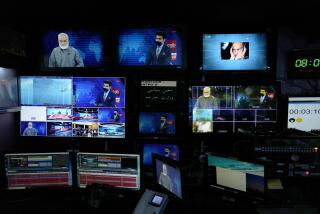Musharraf reins in broadcasters amid unrest
- Share via
ISLAMABAD, PAKISTAN — President Pervez Musharraf, the besieged military leader of Pakistan, sharply tightened restrictions Monday on the nation’s broadcast media.
The move was the latest signal that Gen. Musharraf intends to respond to a wave of popular unrest by cracking down on perceived foes rather than acceding to calls that he step aside or allow fair elections to be held.
The new restrictions appear aimed at diminishing the role that the country’s independent television stations have played in galvanizing anti-government sentiment during a 3-month-old political crisis.
Musharraf’s administration has increasingly sought to limit television coverage of large anti-government rallies across the country, which has been avidly followed by many ordinary Pakistanis.
The tightened restrictions on Pakistani media mark a major reversal for Musharraf, who had previously ushered in greater freedom for newspapers and broadcasters.
Under the new rules, which were set forth in an emergency ordinance signed into law by the president, broadcasters can lose their licenses, have their premises sealed and be fined more than $160,000 for violating government directives.
Journalists, together with members of opposition parties and other activists, staged a rally Monday evening to protest the new measures, defying a ban announced last week on gatherings of more than five people in the capital.
Hundreds took part in a march from the offices of the Geo Television Network to the parliament building in central Islamabad, the capital. “Musharraf, we don’t accept your laws!” the protesters chanted.
Police with riot shields and batons kept watch but did not attempt to intervene.
The new restrictions were announced two days after the government told broadcasters not to carry live coverage of a march Saturday by supporters of Chief Justice Iftikhar Mohammed Chaudhry, who was suspended three months ago by Musharraf on charges of misconduct.
Chaudhry denies the charges and rejected the president’s demand that he resign. Parallel hearings on the issue are underway before a judicial panel and the Supreme Court.
The suspension of the chief justice, who was seen as a likely obstacle to Musharraf’s plans to have himself elected to a new five-year term by a lame-duck parliament, has prompted by far the largest anti-government rallies seen during the general’s nearly eight years in power.
Opposition parties, emboldened by the surge of anti-government sentiment, have demanded that Musharraf renounce his role as army chief if he wishes to remain in power.
Musharraf’s administration had previously told broadcasters to stop fomenting an “anti-state attitude” and warned them against impugning the integrity of the military.
The general got a vote of confidence last week from senior army chiefs, whose support is crucial to his staying in power. In a statement, the military denounced what it called a “malicious” anti-government campaign.
Pakistan is a key ally of the U.S. in the fight against Islamist insurgents in Afghanistan. The Bush administration has continued to express support for Musharraf amid the unrest.
Special correspondent Zaidi reported from Islamabad and Times staff writer King from Istanbul, Turkey.
More to Read
Sign up for Essential California
The most important California stories and recommendations in your inbox every morning.
You may occasionally receive promotional content from the Los Angeles Times.













